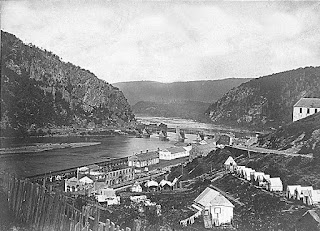To the PRESIDENT:
I have the whole rebel force in front of me, but am confident, and no time shall be lost. I have a difficult task to perform, but with God's blessing will accomplish it. I think Lee has made a gross mistake, and that he will be severely punished for it. The army is in motion as rapidly as possible. I hope for a great success if the plans of the rebels remain unchanged. We have possession of Catoctin. I have all the plans of the rebels, and will catch them in their own trap if my men are equal to the emergency. I now feel that I can count on them as of old. All forces of Pennsylvania should be placed to co-operate at Chambersburg. My respects to Mrs. Lincoln. Received most enthusiastically by the ladies. Will send you trophies. All well, and with God's blessing will accomplish it.
GEO. B. McCLELLAN.
 |
| Relative positions of the armies in Maryland, Sept. 13, 1862 Click on map to enlarge. |
—1st Lt. Josiah Marshall Favill, a young Englishman serving in the 57th New York Infantry, gives this vivid account of the Union troops re-occupying Frederick, Maryland, which is principally a Unionist town:
—Col. Rutherford B. Hayes, of the 23rd Ohio of Cox’s Division, adds his eyewitness to the scene in Frederick:
—As a result of Little Mac’s orders to his cavalry, we have this episode from George Michael Neese, of Chew’s Battery, serving with Gen. Stuart’s Rebel cavalry division:
—The C.S.S. Alabama captures the whaler Altahama, out of New Bedfore, in Azorean waters, and burns the prize at sea.
—Stonewall Jackson’s troops have fully invested Harper’s Ferry, and Col. Dixon Miles, the garrison commander, makes no serious attempt to break out. Most of his 14,000 men are green troops. The importance of Harper’s Ferry to the Rebels is partly due to the fact that it sits across Lee’s line of supply and retreat. But mostly its arsenals are stocked with modern rifle muskets in large quantity, and munitions and equipment of all sorts. As Jackson’s men occupy Bolivar Heights, he is shocked to see that the Yankees have made no attempt to hold the heights.
Battle of Harper’s Ferry: Day 1 - Col. Miles’ first mistake was not fortifying the heights surrounding the town, and he is left to defend just the town itself, which is at the bottom of a bowl between three high ridges—although across the river, Miles placed four regiments of Federals under Col. Ford on Maryland Heights. In the wee hours of this morning, McLaws sends forward Kershaw’s South Carolinian brigade, while Barksdale’s Mississippians try to turn Ford’s right flank. Ford’s green troops break and run, and all of the high ground is now in Southern hands. Rebel guns begin to shell the Federal positions. Miles smuggles out a small party of cavalry who dash toward Frederick and the Gen. McClellan with news of the siege.
 |
| Harper's Ferry, Virginia, 1862 |
—Kentucky: Realizing that Gen. Bragg and his Confederates are in Glasgow, Kentucky, far to the north of Nashville, Gen. Buell understands that Bragg is not after Nashville, but Kentucky. He orders Gen. George M. Thomas to march quickly north to Bowling Green with two divisions, to stave off a Rebel attack on this vital link in Federal communications.
—The Rebel guerilla chief Col. Porter, at the head of 500 men, raids Palmyra, Missouri this day, and breaks out 40 Rebel prisoners who were being held there by the Federals.


No comments:
Post a Comment